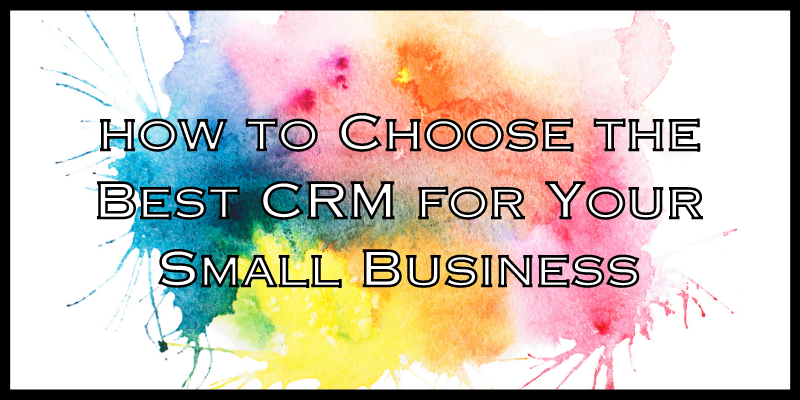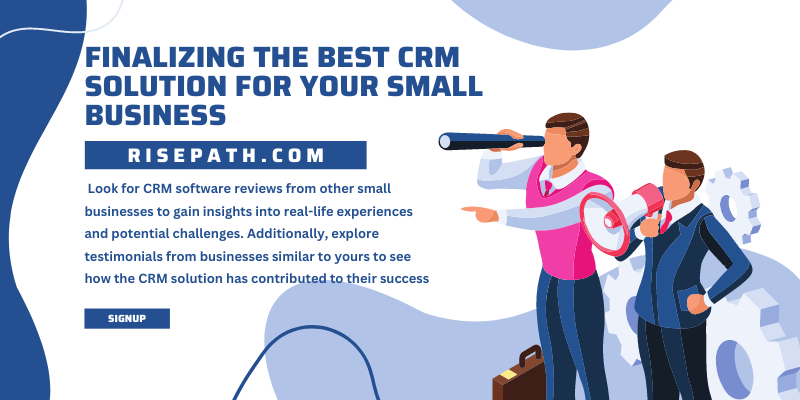In the competitive landscape of today’s business world, small enterprises need effective tools to manage their customer relationships efficiently. Customer Relationship Management (CRM) systems play a pivotal role in helping businesses streamline their operations, boost customer satisfaction, and drive growth. This article serves as a comprehensive guide to help small business owners make informed decisions when choosing the best CRM solution tailored to their unique needs and goals.
Identifying Your Business Needs and Goals
Before diving into the realm of CRM options, it is essential to conduct a thorough assessment of your small business’s needs and goals. Consider your current customer data management processes, sales tracking capabilities, and customer support requirements. By identifying your specific needs, you can narrow down the CRM solutions that align with your objectives, ensuring a more efficient selection process.
Evaluating Key Features and Functionality
Each small business has different operational demands, and choosing the right CRM system requires evaluating key features and functionalities that cater to those requirements. Critical features for small businesses include contact management, lead tracking, email marketing integration, and reporting and analytics. Robust contact management allows you to organize and segment customer data effectively, while lead tracking helps monitor prospects through the sales pipeline. Integration with email marketing ensures targeted communication, and reporting and analytics provide valuable insights for data-driven decision-making.
Budget Considerations: Finding a CRM Solution that Fits Your Finances
While investing in a CRM system is crucial for small businesses, it’s essential to find an affordable solution that fits your budget. Fortunately, there are various CRM options tailored to the financial constraints of small enterprises. Consider different pricing models, such as subscription-based plans or one-time payments, and carefully assess the features offered under each pricing tier. Additionally, watch out for hidden costs like additional user licenses or data storage fees, which can impact your budget over time.
User-Friendliness and Ease of Implementation
As a small business, your resources may be limited, making it crucial to choose a CRM system that is user-friendly and easy to implement. A seamless user interface (UI) design facilitates swift adoption and minimizes the learning curve for your team. Integration with existing systems and tools, such as email clients or project management platforms, can further enhance the CRM’s usability, ensuring a smooth transition into the new system.
Safety and Security Measures: Protecting Your Customer Data
The security of customer data should be a top priority when choosing a CRM solution. Ensure that the CRM provider employs robust data security measures, such as encryption protocols and user access controls, to safeguard sensitive information. Compliance with industry standards and regulations like GDPR (General Data Protection Regulation) or CCPA (California Consumer Privacy Act) is also essential to ensure your small business stays in line with legal requirements.
Researching Customer Reviews and Industry Recommendations
Before finalizing your decision, it’s essential to research customer reviews and seek industry expert recommendations. Look for CRM software reviews from other small businesses to gain insights into real-life experiences and potential challenges. Additionally, explore testimonials from businesses similar to yours to see how the CRM solution has contributed to their success. Industry expert recommendations can also provide valuable insights into market trends and top-performing CRM systems for small businesses.
Finalizing the Best CRM Solution for Your Small Business
To make an informed decision, create a CRM comparison matrix that lists the key features, pricing, and customer reviews of the shortlisted solutions. This matrix will help you visualize the differences between various CRM options, making it easier to select the one that aligns best with your small business needs. Additionally, develop a CRM selection checklist that includes your must-have features, budget constraints, and security requirements. This checklist will serve as a reference point during vendor demos and vendor discussions, ensuring that you don’t overlook any critical aspects.
Many CRM providers offer trial periods, allowing you to test the software before committing to a long-term contract. Take advantage of these trial periods to get hands-on experience with the CRM system and assess its usability and functionality in a real-world setting. Involve your team in the trial process and gather their feedback to ensure the system meets their needs as well.
During the evaluation phase, don’t hesitate to reach out to the CRM vendors with any questions or concerns you may have. A responsive and knowledgeable customer support team is a positive sign of a reliable CRM provider. Their ability to address your queries promptly and offer helpful solutions can influence your overall experience with the system.
Boost Efficiency and Growth with the Right CRM Solution for Your Small Business
In conclusion, a well-chosen CRM system can be a game-changer for small businesses, boosting efficiency, enhancing customer relationships, and driving growth. By understanding your business needs and goals, evaluating key features and functionality, considering your budget constraints, and prioritizing safety and security, you can select a CRM solution that aligns perfectly with your requirements.
Through user-friendliness and ease of implementation, you can ensure a smooth transition for your team and maximize the CRM’s potential. The integration of the CRM with existing systems and tools streamlines your operations and optimizes your workflow. Furthermore, safeguarding customer data through stringent security measures is crucial for building trust with your clientele and remaining compliant with data protection regulations.
By researching customer reviews and industry recommendations, you can gain valuable insights from other small businesses’ experiences, paving the way for a more informed decision. Utilizing a CRM comparison matrix and a selection checklist enables you to make a side-by-side comparison of potential CRM solutions, helping you choose the one that best meets your needs.
In the end, don’t rush the decision-making process. Take the time to thoroughly evaluate and test different CRM options, making sure that the one you choose is the best fit for your small business. Remember that the right CRM solution can revolutionize your customer management and set your business on a path to success.
Embrace the power of CRM technology, and witness how it transforms your small business into a well-oiled machine, where customer satisfaction, growth, and success are at the forefront of your operations. With the right CRM system in place, you’ll be able to build stronger relationships with your customers, increase sales, and ultimately, achieve your business goals. So, take the first step in finding the perfect CRM solution for your small business today and unlock the full potential of your enterprise.
For more information and a free informational ebook, please add your contact info. Thanks.




Comments are closed, but trackbacks and pingbacks are open.